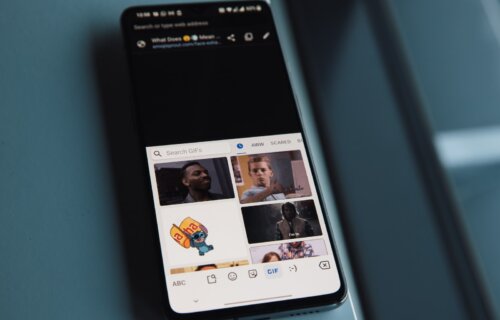PROVO, Utah — Are your text conversations full of GIFs? These short-but-expressive scenes are becoming a common form of communication for people of all ages in modern society. While you may not put much thought into your GIF usage, a new study explains that how and when you use GIFs says a lot about the way you communicate.
Even more than memes and emojis, GIF fans believe these scenes do a great job of effectively communicating humor and allow them to fully express themselves to others. BYU communications professor Scott Church and his team expands on this, saying that there are actually three different types of GIF users — Enthusiasts, Searchers, or Referentialists.
So, which kind of GIF user are you?
GIF Enthusiasts love to show off their internet savvy
Church says these people know their GIFs inside and out. They typically use them to make others laugh and see GIFs as a meaningful way to express themselves. The study also finds that Enthusiasts typically like to impress others with their GIF knowledge and feel GIFs provide greater social benefits than sending emojis.
“I hate that my body language cannot be expressed through texting; too much of our communication is lost,” one GIF Enthusiast says in a university release. “I think GIFs help bring restore a bit of what is lost.”
Church adds that Enthusiasts usually have a great knowledge of internet culture and see emojis as stagnant and overused. To keep that from happening to GIFs, these texters stay up to date on the latest trends and popular GIF expressions.

Searchers have to find the perfect response
For Searchers, the BYU team says it’s all about the “thrill of the hunt.” These people have to find that one perfect GIF before they send a reply.
Since every conversation is unique, study authors find that Searchers like to find GIFs which exactly match what they want to say or express to someone. “A friend will do something and then I’ll find one that shows what they did,” one participant says.
While Searchers use GIFs during humorous and lighthearted conversations, they tend to avoid them when discussing more serious topics. Searchers also prefer to use funny, quick, and easy-to-watch GIFs, instead of longer or more romantic ones.
Church adds Searchers actually enjoy scrolling through countless GIFs in order to find an expression that is “just right” — often viewing this as a personal challenge.
Referentialists pull their GIFs from pop culture
Unlike Searchers, the BYU team says Referentialists dislike having to scroll through GIFs. They are typically fans of pop culture and are more likely to use their GIFs as a response to someone else’s GIF.
“I love using pop culture… it’s kind of like an inside joke,” one Referentialist tells the study authors. “If there’s someone who likes to use GIFs, I try to reciprocate that… to match their style,” another participant adds.
These texters often stick to scenes that are fandom-specific — adding to their inside jokes with friends. However, Referentialists often feel they’re sending out GIFs as part of a social obligation. They assume their friends will find it funnier if their GIFs connect to a funny show or game.
Interestingly, Referentialists also send GIFs in an effort to defuse or avoid awkward conversations.
“Sometimes people say things that are awkward or in poor taste,” one study participant explains. “You don’t really want to respond, but you have the obligation to. So, a GIF is a funny, semi-sarcastic way of responding to it. And it can help divert the situation.”
The findings are published in Convergence: The International Journal of Research into New Media Technologies.

